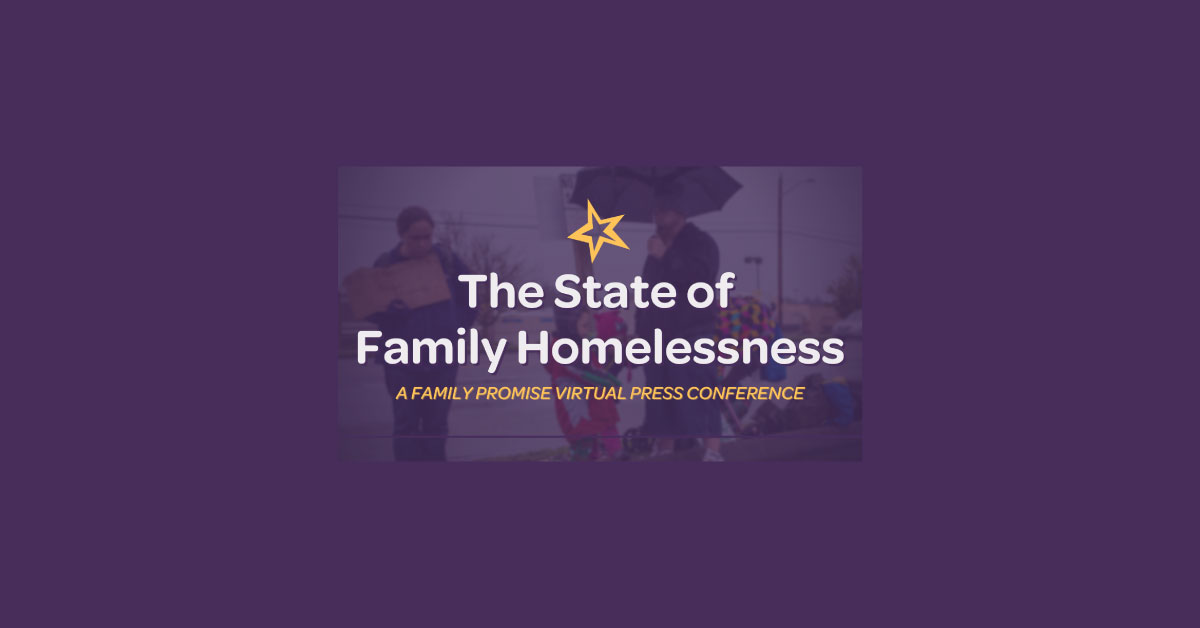Virtual Press Conference Brings Together All-Female Panel of Experts
 According to data released in 2019 by the U.S. Department of Education, one in sixteen children in the United States experience homelessness before their sixth birthday. That’s one child in every kindergarten classroom.
According to data released in 2019 by the U.S. Department of Education, one in sixteen children in the United States experience homelessness before their sixth birthday. That’s one child in every kindergarten classroom.
In 2020, obtaining housing, maintaining employment, finding childcare, supporting children’s education, and staying healthy have all become harder for low-income families across America. On a panel facilitated by Family Promise, experts discussed the impact of COVID-19, homelessness, and the realities of racial inequality (View the Full Recording).
“Most families and children experiencing homelessness are not being supported by existing or proposed COVID-19 funding streams. Yet, COVID-19 has only exacerbated challenges for these families,” said Barbara Duffield, Executive Director of SchoolHouse Connection. “Local providers and schools are handcuffed by existing structures, and neither the Democratic nor the Republican proposed relief package address the pressing and real needs.”
When Kat Lilley-Blair experienced homelessness with her six children, Family Promise was there to help her get back on her feet. Today, she is the CEO of Family Promise of Colorado Springs, sits on the national board, and has testified before Congress about the need to ensure children experiencing homelessness are properly counted and served. Currently, a child living in a motel or on a friend’s couch is not considered homeless by HUD.
With the end of many eviction moratoria looming, families like Kat’s are reaching out to express fears of losing their homes. “The reality for families is that landlords have already filed eviction proceedings,” says Claas Ehlers, CEO of Family Promise. “Locally, our 200 Affiliates are also reporting spikes in ‘soft evictions’—neglect and harassment to drive tenants away. Add to this the hundreds of thousands of families in motels and doubled up situations, for whom there are no protection. We fear there will be a tidal wave of family homelessness in the new year.”
Housing plays a central role in a parent’s ability to maintain employment and in children succeeding academically. The realities of race and space are critical to understanding how Black families have been impacted not just health-wise by COVID-19, but economically, says Dr. Kesha Moore, Senior Researcher and Development Specialist, the NAACP Legal Defense.
“We need to understand race as a system that economically privileges White people and makes Black people vulnerable. Racial inequality in wealth and housing are two primary drivers of the patterns we observe in race and homelessness,” she says.
According to data from the SPARC Report 2018, Black people make up 12.4% of the US population, 26% of individuals experiencing poverty, and 64.7% of individuals experiencing homelessness. That is in large part because the median Black household net worth ($17,600) is 1/10 of that of White households ($171,000).
The panel was facilitated by CEO Claas Ehlers. Panelists included:
- Barbara Duffield – Executive Director, SchoolHouse Connection
- Jennifer Erb-Downward – Senior Research Associate, Poverty Solutions at the University of Michigan
- Kat Lilley-Blair – CEO, Family Promise of Colorado Springs
- Dr. Kesha Moore – Senior Researcher and Development Specialist, the NAACP Legal Defense Fund’s Thurgood Marshall Institute

